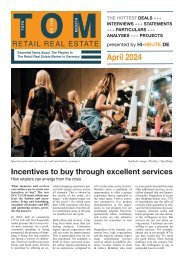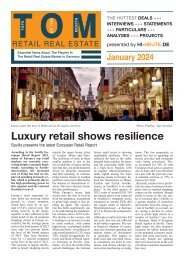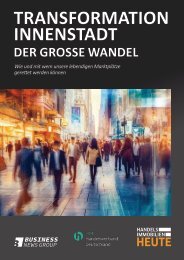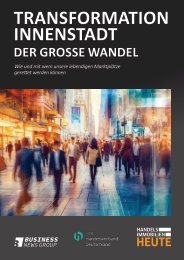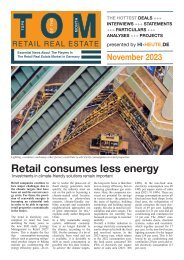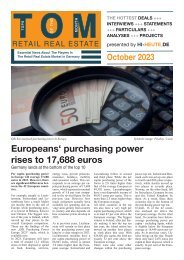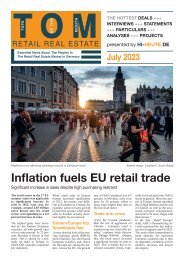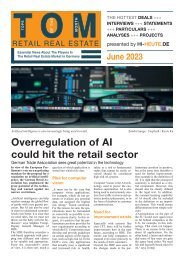You also want an ePaper? Increase the reach of your titles
YUMPU automatically turns print PDFs into web optimized ePapers that Google loves.
T<br />
TOPS<br />
M<br />
OF THE MONTH<br />
<strong>TOM</strong>O<br />
RETAIL REAL ESTATE<br />
TOPS<br />
OF THE<br />
MONTH<br />
Essential News About The Players In In<br />
The Retail Real Property Estate Market In in Germany<br />
THE HOTTEST DEALS +++<br />
INTERVIEWS +++ STATEMENTS<br />
+++ PARTICULARS +++<br />
ANALYSES +++ PROJECTS<br />
presented by HI-HEUTE.DE<br />
December <strong>2023</strong><br />
The consumer climate appears to be on the right track at the end of the year. <br />
Consumer sentiment brightens<br />
at the end of the year after all<br />
GfK: However, lasting recovery remains to be seen<br />
Consumer sentiment in Germany<br />
brightened somewhat<br />
towards the end of the year:<br />
Both income expectations and<br />
the propensity to buy recorded<br />
noticeable increases. The<br />
economic outlook also improved<br />
slightly.<br />
The consumer climate rose to<br />
-25.1 points in the forecast for<br />
January 2024 - an improvement<br />
of 2.5 points compared to the<br />
previous month (revised -27.6<br />
points). These are the results of<br />
the GfK Consumer Climate powered<br />
by NIM for December<br />
<strong>2023</strong>, which has been published<br />
jointly by GfK and the Nuremberg<br />
Institute for Market Decisions<br />
(NIM), founder of GfK,<br />
since October <strong>2023</strong>.<br />
With these results, the consumer<br />
climate is on the rise again<br />
after a rather stagnant development<br />
recently. The last time the<br />
consumer climate was slightly<br />
higher was in August of this<br />
year at -24.6 points. „It remains<br />
to be seen whether the current<br />
rise is the start of a sustained recovery<br />
in consumer sentiment,“<br />
explains Rolf Bürkl, consumer<br />
expert at NIM. „Consumers are<br />
still very worried. Geopolitical<br />
crises and wars, sharply rising<br />
food prices and discussions about<br />
the national budget for 2024<br />
continue to cause uncertainty.<br />
As a result, the level of consumer<br />
confidence is currently still<br />
extremely low.“ For a sustainable<br />
upturn in consumer confidence,<br />
GfK and NIM believe it<br />
is necessary to tackle the causes<br />
of the uncertainty and find a solution.<br />
In concrete terms, this<br />
means that further steps must be<br />
taken towards price stability and<br />
solutions must be found for the<br />
various trouble spots.<br />
The main pillar supporting the<br />
positive development of the<br />
consumer climate this month is<br />
income expectations. In December,<br />
it increased by 9.8 points<br />
compared to the previous month,<br />
climbing to -6.9 points. A better<br />
value was last measured in July<br />
<strong>2023</strong> with -5.1 points. One of<br />
the main reasons for the increased<br />
income optimism is certainly<br />
the expected significant growth<br />
in the most important source of<br />
income for private households:<br />
wages and salaries or pensions.<br />
This is confirmed by an in-depth<br />
analysis recently carried out by<br />
the NIM: German consumers<br />
were asked why they expect<br />
their financial situation to improve.<br />
In the open survey, around a<br />
third of respondents answered<br />
that past or future wage/salary<br />
increases and pension increases<br />
would lead them to make this<br />
positive assessment. This is by<br />
Symbolic image: Depositphotos / Vitalik Radko<br />
far the most important reason<br />
given. A number of other reasons<br />
were also given, such as<br />
job security or career changes/<br />
improvements, for example the<br />
end of training. However, saving<br />
money by reducing expenditure<br />
was also mentioned spontaneously<br />
by around one in ten<br />
respondents.<br />
I the wake of improved income<br />
prospects, the propensity to buy<br />
has also increased noticeably: after<br />
a period of stagnation lasting<br />
around one and a half years, the<br />
indicator has gained 6.2 points<br />
and now stands at -8.8 points.<br />
The last time consumer sentiment<br />
was higher was in March<br />
2022 at -2.1 points. Despite the<br />
significant increases, the level<br />
of propensity to buy is currently<br />
still below the level of the two<br />
lockdowns during the coronavirus<br />
pandemic in 2020/2021.
Page 2<br />
The pan-European real estate<br />
investment and development<br />
company Eurofund Group<br />
and the London-based private<br />
equity firm Signal Capital<br />
Partners confirm that CBRE<br />
Retail Consulting will take<br />
over the marketing and management<br />
of the Rhein-Ruhr-<br />
Zentrum (RRZ) in Mülheim<br />
at the beginning of 2024.<br />
CBRE Retail Consulting, based<br />
in Düsseldorf, specializes<br />
in leasing, consulting and management<br />
of shopping centers<br />
and retail parks and has more<br />
than 30 years of experience in<br />
this field. In September, the global<br />
real estate services provider<br />
CBRE acquired Prime Consulting<br />
from CEO and owner Alastair<br />
Green, who in turn is expanding<br />
its consulting services<br />
for the retail sector in Germany<br />
with the takeover.<br />
The Eurofund Group and<br />
CBRE have already worked together<br />
successfully on the Puerto<br />
Venecia project in Spain and<br />
the UBBO project in Portugal.<br />
The 206,000 square meter Puerto<br />
Venecia project opened in<br />
20<strong>12</strong>, marked the birth of the<br />
shopping resort concept and<br />
now attracts over 20 million<br />
visitors annually. The Eurofund<br />
Group has also pursued<br />
the same concept in the transformation<br />
of UBBO Lisbon,<br />
which has established itself as<br />
one of the city‘s leading centers<br />
and recently broke through the<br />
20 million visitor barrier. With<br />
the Rhein-Ruhr-Zentrum, Eurofund<br />
Group, Signal and CBRE<br />
will bring the shopping resort<br />
concept to Germany, combining<br />
the best of retail with a<br />
comfortable public space and<br />
leisure activities for the whole<br />
family.<br />
NEWS<br />
CBRE takes over management<br />
of the Rhein-Ruhr-Zentrum<br />
The partners are implementing a shopping resort concept in Mülheim<br />
CBRE will manage the Mülheim Rhein-Ruhr-Zentrum in the future.<br />
<br />
Visualization: Eurofund<br />
Ian Sandford, President of Eurofund<br />
Group: „We are delighted<br />
to have selected CBRE as a<br />
strong strategic partner for this<br />
project, who will support us in<br />
realizing our vision of transforming<br />
the Rhein-Ruhr-Zentrum<br />
in Mülheim back into a regionally<br />
significant and innovative<br />
district center. We will be working<br />
with one of the most experienced<br />
retail specialists in the<br />
whole of Germany, led by Alastair<br />
Green with over 20 years<br />
of retail experience and a team<br />
of 50 retail experts. As well as<br />
building on our strong relationships<br />
with existing tenants, our<br />
joint aim is to attract new partners<br />
to the building and offer an<br />
attractive and innovative mix of<br />
retail, food and leisure.“<br />
December <strong>2023</strong><br />
Ifo does not yet see a<br />
decline in inflation<br />
According to the economic research<br />
institute Ifo, the easing of<br />
consumer prices is likely to stall<br />
for the time being. The proportion<br />
of companies in Germany<br />
that want to raise their prices in<br />
the coming months is increasing<br />
again, the Munich-based researchers<br />
announced this morning.<br />
Ifo price expectations rose to 19.7<br />
points in December from 18.1<br />
points in November. Expectations<br />
had reached a temporary low<br />
in August with a balance of 14.5<br />
points.<br />
The experts expect more price<br />
increases in consumer-related<br />
service sectors. „Restaurateurs in<br />
particular want to increase prices<br />
noticeably“, the institute reported.<br />
In this area, the balance rose<br />
from 45.9 to 87.6 points.<br />
Deutsche Konsum:<br />
FFO significantly below<br />
the previous year<br />
Deutsche Konsum REIT-AG recently<br />
published its final and audited<br />
figures for the past financial<br />
year 2022/<strong>2023</strong>: Rental income<br />
increased by 7% to 79.7 million<br />
euros, while rental income rose<br />
slightly by 1.8% to 48.3 million.<br />
Further facts: FFO decreased to<br />
EUR 33.1 million due to interest /<br />
FFO per share is EUR 0.66 (fully<br />
diluted). The real estate portfolio<br />
has a balance sheet value of EUR<br />
1.0 billion.<br />
URW opts for green electricity at Ruhr Park<br />
Germany‘s largest photovoltaic system on the roof of a shopping center<br />
Together with Stadtwerke Bochum,<br />
Ruhr Park is taking a<br />
major step towards sustainability:<br />
by spring next year, the<br />
Bochum-based energy supplier<br />
will install a photovoltaic<br />
system on the roof of Ruhr<br />
Park. With over 3,600 modules<br />
and an annual electricity<br />
yield of over 1.4 million kilowatt<br />
hours, this will be Germany‘s<br />
largest photovoltaic<br />
system on the roof of a shopping<br />
center.<br />
The project underlines the fact<br />
that the retail and leisure destination<br />
takes its corporate responsibility<br />
in the city and region<br />
seriously and is expanding<br />
and strengthening strategic partnerships<br />
with local companies<br />
Ruhr Park Bochum is getting a large photovoltaic system.<br />
<br />
Photo: URW<br />
and organizations. The state-ofthe-art<br />
system is an important<br />
milestone on the way to achieving<br />
the medium and long-term<br />
goals of Ruhr Park‘s operator<br />
and owner, Unibail-Rodamco-Westfield:<br />
to reduce CO2<br />
emissions along the entire value<br />
chain by 50 percent by 2030 and<br />
by 90 percent by 2050 compared<br />
to 2015. The first work on<br />
the plant has lready begun and it<br />
is scheduled to go into operation<br />
in April 2024. The photovoltaic<br />
system, which consists of a total<br />
of 3626 modules, will then<br />
generate around 1,434,000 kilowatt<br />
hours of green electricity<br />
per year. This is roughly equivalent<br />
to the electricity consumption<br />
of 410 single-family homes.<br />
T643,000 kilowatt hours from<br />
the plant will cover 44.8 percent<br />
of the total electricity consumption<br />
of the public areas of Ruhr<br />
Park. Lars Horn, Center Manager<br />
at Ruhr Park, says: „Making<br />
renewable energy usable for our<br />
shopping center is an important<br />
step in our sustainability concept.<br />
The plant is not only a sign<br />
of the ecological responsibility<br />
that we are assuming locally,<br />
but also offers direct economic<br />
benefits because it has a positive<br />
impact on energy purchasing.“
Page 3<br />
TOP STATEMENT OF THE MONTH December <strong>2023</strong><br />
TOP STATEMENT<br />
December<br />
„Energy subsidies help<br />
to remedy urban development<br />
problems.<br />
It doesn‘t get any<br />
better than that.“<br />
Architect Michael Maas (Mass<br />
& Partner) in an interview with<br />
Immobilien Zeitung, Germany
Integrated approach<br />
to real estate<br />
We find solid platforms from which we can create sound investments, all around the<br />
world. From shopping to public or living spaces, from management to turnkey projects,<br />
we are the most far-sighted partner when developing innovative concepts.<br />
www.sonaesierra.com
Page 5 ANALYSES December <strong>2023</strong><br />
A look into the future based on inflation<br />
Gfk experts provide consumer forecasts for 2024<br />
Multiple crises and a high<br />
inflation rate have characterized<br />
the year <strong>2023</strong>. Many<br />
consumers are unsettled, the<br />
consumer climate is stagnating.<br />
How has this year<br />
changed consumers and their<br />
values? And what will be important<br />
in 2024? Experts from<br />
GfK and NIQ look back and<br />
provide data-based forecasts<br />
for the new year.<br />
The current crises are leading<br />
to a growing need for security.<br />
Women, people on low incomes<br />
and young people in particular<br />
show an above-average<br />
orientation towards security.<br />
„Generation Z and millennials<br />
are unsettled by a variety of<br />
issues, such as terrorism, environmental<br />
pollution, the quality<br />
of education, the impact of disruptive<br />
technologies on society,<br />
recession and unemployment.<br />
As a result, they are probably<br />
looking for stability more than<br />
older people,“ explains Petra<br />
Süptitz, consumer trends expert<br />
at GfK. „This is also reflected<br />
in their purchasing behavior.<br />
Young consumers trust established<br />
brands more often than older<br />
people because they rely on<br />
their proven quality. They will<br />
continue to do so in the coming<br />
year.“<br />
Trend towards<br />
retreating into the<br />
home<br />
Consumption and inflation in the coming year - GfK and NIQ provide<br />
forecasts. Symbolic image: Depositphotos / Igor Vetushko<br />
Older and financially less crisis-proof<br />
people in particular<br />
are retreating into their homes.<br />
This is accompanied by a trend<br />
towards domestic activities such<br />
as cooking and repair work. Social<br />
activities are also shifting to<br />
the home: while 30% of 20 to<br />
29-year-olds had guests at home<br />
at least once a week in 2019,<br />
this figure had risen to 37% by<br />
<strong>2023</strong>. This is presumably also<br />
due to price increases in the catering<br />
industry and may increase<br />
further with the return of VAT<br />
from January 2024. Already,<br />
43% of Germans are eating out<br />
less often to save money. Climate<br />
change remains the third biggest<br />
concern for Germans. This<br />
means that sustainability will<br />
remain a relevant topic in 2024,<br />
although the latest GfK Sustainability<br />
Index showed that the<br />
willingness to pay for sustainable<br />
purchases has decreased<br />
slightly.<br />
The situation is different for<br />
technical consumer goods,<br />
especially larger household appliances:<br />
Consumers are willing<br />
to pay more for sustainable refrigerators,<br />
washing machines<br />
or dishwashers, as it is not only<br />
the environment that benefits,<br />
but also the consumer. Buyers<br />
pay eleven percent more than<br />
the average for washing machines<br />
with an A energy efficiency<br />
label. At the same time, their<br />
market share is increasing: while<br />
37% of all washing machines<br />
were in energy efficiency class<br />
A in 2022, for example, this figure<br />
had risen to 60% in the first<br />
ten months of <strong>2023</strong>. These appliances<br />
are attractive because<br />
they consume less energy and<br />
allow consumers to save money<br />
during operation. Consumers<br />
are also increasingly opting for<br />
durable appliances - as this also<br />
reduces the life cycle costs of<br />
the product. „Consumers want<br />
to make their everyday lives<br />
easier with technical aids. In<br />
a time of many simultaneous<br />
crises, at least the home should<br />
be an uncomplicated, stressfree<br />
retreat,“ says Alexander<br />
Dehmel, expert for technical<br />
consumer goods at GfK. „And<br />
they are willing to pay for it:<br />
52% of Germans say they are<br />
prepared to spend more money<br />
on products that make their lives<br />
easier. This is where growth<br />
opportunities lie for 2024.“ In<br />
the FMCG sector - i.e. food and<br />
drugstore products - consumers<br />
are becoming more price-sensitive.<br />
In <strong>2023</strong>, private labels<br />
were on the rise: on the one<br />
hand due to lower prices, on the<br />
other hand the image of private<br />
labels has also changed. According<br />
to NIQ data, many consumers<br />
see private labels as a good<br />
alternative to branded products<br />
(51%) and often consider them<br />
to be of equal or even better<br />
quality (41%). In competition<br />
with stronger private labels,<br />
it is important for traditional<br />
brands to sharpen their unique<br />
selling points and rethink their<br />
value proposition. For example,<br />
a stronger focus on certain<br />
product characteristics such as<br />
effectiveness or sustainability<br />
can help them remain competitive.<br />
„The industry is aware of<br />
the challenge of finding a balance<br />
between price and image.<br />
Our recent NIQ Insider Survey<br />
of industry executives revealed<br />
that in 2024, they believe products<br />
must offer good value for<br />
money and be affordable in order<br />
to be successful,“ explains<br />
Enrico Krien, consumer expert<br />
at NIQ.<br />
Price and promotion management<br />
will play a decisive role<br />
in the coming year, not only for<br />
manufacturers but also for retailers.<br />
In view of limited consumer<br />
budgets, retailers will<br />
have to find the right balance<br />
between attractive prices and<br />
promotions with relevant margins<br />
in order to attract consumers<br />
on the one hand and secure<br />
important margins on the other.<br />
Category management will also<br />
be even more relevant in 2024<br />
in order to identify growth areas<br />
and better exploit them with<br />
products and services relevant<br />
to the respective target group<br />
segments. New product ranges,<br />
products or brands can also secure<br />
important sales. To do this,<br />
retailers must have a precise<br />
understanding of customer preferences<br />
and market conditions.<br />
Relying on gut instinct is no<br />
longer enough in such volatile<br />
times - not least because consumer<br />
segments are becoming<br />
increasingly fragmented. Additional<br />
margins are offered by<br />
the monetization of data and<br />
specific retail media offerings,<br />
which also enable the industry<br />
to address relevant buyer segments<br />
in a targeted and efficient<br />
manner.<br />
Customer<br />
centricity and<br />
customization<br />
„In a digitalized world where<br />
change is the new normal, unconditional<br />
customer centricity<br />
and adaptability are important<br />
keys to success. Retailers who<br />
set up their strategy based on<br />
data and constantly adapt it will<br />
be better positioned to meet the<br />
ever-changing demands of consumers.<br />
This is how retailers ensure<br />
long-term success,“ summarizes<br />
Oliver Schmitz, retail<br />
trends expert at NIQ and GfK.<br />
T<br />
TOPS<br />
O M<br />
OF THE MONTH<br />
<strong>TOM</strong><br />
TOPS<br />
OPS F THE ONTH<br />
OF THE<br />
RETAIL REAL ESTATE<br />
Essential News About The Players In In<br />
The Retail Real Property Estate Market In in Germany<br />
IMPRINT<br />
MONTH<br />
Publisher:<br />
Business News Group GmbH<br />
Address:<br />
Alexanderstraße 16<br />
45130 Essen<br />
Germany<br />
Tel. 0049-201-874 55 28<br />
Web: www.hi-heute.de<br />
Mail: tom@hi-heute.de<br />
Frequency of publication:<br />
monthly<br />
Circulation: approx. 5000 copies<br />
sent by e-mail<br />
Editorial team: Susanne Müller,<br />
Thorsten Müller<br />
Responsible in terms of press<br />
law: Thorsten Müller<br />
Layout: K4-PR, Essen<br />
THE HOT<br />
INTERVIE<br />
+++ PART<br />
ANALYSE<br />
presente<br />
March
URBAN CREATORS.<br />
Architecture | Development & Project Management<br />
European Council of Shopping Places (ECSP) Awards: Commendation for Best Renovation/Expansion for centres between 15.000 – 45.000 sqm
Page 7 NEWS December <strong>2023</strong><br />
Battle for market share<br />
with non-food discounters<br />
Atradius expects a wave of consolidation<br />
Stinginess is cool - this consumer<br />
leitmotif seems more<br />
relevant than ever in view of<br />
the inflation rate, high energy<br />
prices and declining propensity<br />
to consume. But not everyone<br />
benefits from this motto.<br />
While it‘s all sunshine and roses<br />
at the food discounters, the competitive<br />
pressure is increasing at<br />
non-food discounters - i.e. suppliers<br />
of inexpensive textiles,<br />
shoes, drugstore products and<br />
household goods. „We expect<br />
a wave of consolidation among<br />
non-food discounters in the medium<br />
term,“ says Frank Liebold,<br />
Country Manager Germany at<br />
international credit insurer Atradius.<br />
Tedi, Kodi, Thomas Philipps,<br />
Woolworth, Pfennigpfeifer and<br />
Co. are facing numerous challenges.<br />
In particular, the increases<br />
caused by inflation, minimum<br />
wage increases and higher personnel<br />
costs are weighing on the<br />
companies. Energy costs and rent<br />
increases are also leading to considerable<br />
additional expenditure.<br />
This is because companies pay<br />
index-linked rents linked to the<br />
consumer price index, and these<br />
have developed well to well<br />
in recent years. „However, as<br />
<br />
companies cannot pass on cost<br />
increases to their customers on a<br />
one-to-one basis, this is at the expense<br />
of profitability,“ explains<br />
Frank Liebold. The margins of<br />
non-food discounters have already<br />
fallen from six to ten percent<br />
to just two to four percent. They<br />
are also suffering from declining<br />
footfall in city centers, where<br />
most of their stores are located.<br />
„Discounters that don‘t sell food<br />
are coming under increasing<br />
pressure. And only the large market<br />
players with the corresponding<br />
purchasing power will be<br />
able to survive on the market,“<br />
emphasizes Frank Liebold.<br />
According to Atradius, additional<br />
pressure is being exerted on the<br />
domestic top dogs by internatio-<br />
Photo: Tedi<br />
nal competitors who are forcing<br />
their way onto the German market<br />
- above all the Dutch company<br />
Action and the Polish provider<br />
Pepco. According to market research<br />
institute GfK, Action grew<br />
by 39% in the first six months of<br />
<strong>2023</strong>, while Tedi, previously the<br />
market leader, only grew by 19%.<br />
Pepco is also pursuing ambitious<br />
goals. The Polish chain for clothing<br />
and household goods wants<br />
to open 2,000 stores in Germany.<br />
Pepco already has around 3000<br />
stores across Europe. As a result,<br />
the battle for customers is intensifying.<br />
„The cake isn‘t getting<br />
any bigger, but has to be spread<br />
across more providers - and that<br />
intensifies the battle for market<br />
share,“ says the head of Atradius<br />
Positive trend at the Schwarzwald-Baar-Center<br />
New anchor tenant and refurbishment in Villingen-Schwenningen<br />
Action Deutschland GmbH<br />
(Action) has opened its doors<br />
in the Schwarzwald-Baar-<br />
Center in Villingen-Schwenningen.<br />
The non-food discounter<br />
has leased and refurbished<br />
an area of almost 1,391 square<br />
meters in the existing property<br />
of Berlinovo Immobilien<br />
Gesellschaft mbH (berlinovo)<br />
on a long-term basis, of which<br />
around 920 square meters is<br />
retail space.<br />
By letting this part of the space,<br />
berlinovo is continuing the positive<br />
trend in the development<br />
of this important commercial<br />
location. VÖLKEL Real Estate<br />
GmbH, which is responsible for<br />
center management, brokered<br />
the lease agreement between<br />
Non-food discounters are currently facing a number of challenges.<br />
New anchor tenants Action and Kaufland have moved into the<br />
Schwarzwald-Baar-Center. Photo: Schwarzwald-Baar-Center<br />
berlinovo and the international<br />
company Action.<br />
Carsten Pohnke, Head of Commercial<br />
Real Estate Management<br />
at berlinovo: „The opening<br />
of the Action store shows<br />
Eurozone trade<br />
balance with higher<br />
surplus<br />
The foreign trade surplus in<br />
the eurozone increased in October.<br />
The trade surplus as the<br />
difference between exports<br />
and imports rose from 8.7<br />
billion euros in the previous<br />
month to 10.9 billion euros<br />
after adjustment, according to<br />
the statistics office Eurostat in<br />
Luxembourg. Analysts had on<br />
average only expected an increase<br />
to ten billion euros.<br />
This development is due to increased<br />
exports and lower imports.<br />
Exports climbed by 0.7<br />
percent, while imports fell by<br />
0.3 percent. Foreign trade in<br />
the 27 countries of the European<br />
Union (EU) developed<br />
similarly to the 20 countries of<br />
the European currency area.<br />
Almost one in four<br />
Germans would pay<br />
for gift tips with data<br />
24% of Germans are willing<br />
to disclose their personal data<br />
in return for help in finding<br />
the perfect Christmas present.<br />
This makes Germans the most<br />
willing to provide information<br />
in Europe, while the Dutch<br />
(18 percent), French (16 percent)<br />
and British (11 percent)<br />
responded more cautiously in<br />
a survey conducted by Zendesk,<br />
according to a press<br />
release. When it comes to<br />
the use of AI, Europeans are<br />
that our concept of establishing<br />
a varied mix of well-known national<br />
and international brands<br />
and integrating local players<br />
is working. The Schwarzwald-<br />
Baar-Center is one of the bestknown<br />
and most popular shopping<br />
centers in the region. This<br />
makes it all the more important<br />
to ensure that it remains an attraction<br />
for local people.“<br />
The opening of the Kaufland<br />
store in September of this year<br />
was already a noticeable stimulating<br />
element. The retailer has<br />
leased a section of around 7100<br />
square meters in the Schwarzwald-Baar-Center<br />
on a longterm<br />
basis and acts as the anchor<br />
tenant of the property. Kaufland<br />
closed the gap in the food supply<br />
that had arisen following the<br />
withdrawal of the hypermarket<br />
chain real in 2021. With the arrival<br />
of Action, another vacant<br />
space has now been put to longterm<br />
use in line with customer<br />
requirements.
Page 9 INTERVIEW December <strong>2023</strong><br />
„Experience, empathy and creativity are<br />
back in demand among center managers“<br />
Skills shortage in the retail real estate sector too - interview with HR expert Jutta Heusel<br />
Everyone is talking about the<br />
shortage of skilled workers<br />
and it affects all sectors; the<br />
question is rather how badly<br />
the respective sector is affected.<br />
„It has certainly affected<br />
the retail sector,“ says Jutta<br />
Heusel, who has been working<br />
as an independent personnel<br />
consultant at Kollmannsperger<br />
Executive Search in the<br />
real estate sector for over 20<br />
years, in an interview with<br />
<strong>TOM</strong>. Due to the rise in e-<br />
commerce, bricks-and-mortar<br />
retail has been in a difficult<br />
market situation for years. It<br />
has been hit correspondingly<br />
hard, which is why it is very<br />
difficult to recruit good employees.<br />
Other asset classes<br />
have been booming for a long<br />
time and have therefore been<br />
able to attract the top people.<br />
<strong>TOM</strong>: Ms. Heusel, how is the<br />
personnel issue currently affecting<br />
the retail real estate<br />
segment?<br />
Jutta Heusel: Shopping centers<br />
in particular have gone through<br />
various developments, changes,<br />
expansions, repositioning,<br />
etc. and with these have always<br />
come the corresponding personnel.<br />
Originally, one center manager<br />
and his or her team were<br />
responsible for each shopping<br />
center (and thus the corresponding<br />
center advertising association).<br />
For cost reasons, the team<br />
was first reduced and then, for<br />
reasons of efficiency, the communal<br />
area to be managed was<br />
reduced until today‘s development,<br />
where one center manager<br />
is responsible for several<br />
centers at the same time.<br />
In a fundamentally good market<br />
situation, there are large,<br />
successful centers in busy locations<br />
and smaller centers that<br />
are more tailored to local conditions<br />
and their players. The difficulty<br />
of this task of managing<br />
several centers at the same time<br />
is evident in the current market<br />
situation.<br />
<strong>TOM</strong>: What are the personnel-related<br />
challenges?<br />
Jutta Heusel: Smaller centers<br />
Jutta Heusel, Managing Partner Kollmannsperger Executive Search<br />
GmbH Photo: Kollmannsperger<br />
in particular currently require<br />
a lot of attention and a high<br />
degree of time and creativity in<br />
order to process contracts, implement<br />
insolvencies and redesign<br />
spaces and find new tenants<br />
accordingly. This is the technical<br />
side. The personnel side is<br />
finding suitable staff for the role<br />
of center manager. The focus is<br />
on people with experience, but<br />
they are hardly available on the<br />
market. The shortage of skilled<br />
workers is having a major impact<br />
here. In the past, few new<br />
positions were advertised, so<br />
there are too few and the experienced<br />
ones are usually valued<br />
and satisfied. The smaller<br />
centers are at a disadvantage<br />
because, on the one hand, they<br />
have fewer attractive and larger<br />
tenants and, on the other, they<br />
are in less frequented locations.<br />
Nobody wants to manage difficult<br />
centers either, as it is not a<br />
very promising task to bring about<br />
change here.<br />
<strong>TOM</strong>: What does that mean<br />
in concrete terms?<br />
Jutta Heusel: If in the past a<br />
center manager was primarily<br />
defined by the size, level of<br />
awareness and therefore also<br />
the location of his center (and<br />
his experience could also be<br />
read from this), we currently<br />
have new challenges. As there<br />
have been more young, inexperienced<br />
center managers in<br />
recent times, they have not yet<br />
been able to experience a crisis<br />
and are not used to breaking<br />
new ground. At the moment,<br />
locations are very different and<br />
are drifting further apart than<br />
was the case in the past. Large,<br />
well-functioning centers, which<br />
are controlled by the center manager<br />
from the tenant side via<br />
the head office, contrast with<br />
small, very regional centers that<br />
function via local players and<br />
also have their difficulties here.<br />
Individual action must be taken<br />
here. It helps to have a good and<br />
trusting relationship with the<br />
tenants in order to rethink solution<br />
concepts and changes in the<br />
use of space together with them.<br />
In this way, attractive and functioning<br />
centers can be managed<br />
again.<br />
<strong>TOM</strong>: How have the tasks in<br />
center management changed?<br />
Jutta Heusel: If efficiency<br />
and maximum space utilization<br />
were the focus in the past, individual<br />
solutions are currently in<br />
demand. Center managers are<br />
being taken back into their actual<br />
management role because<br />
they are no longer simply the<br />
administrators of the locations<br />
and organizers of the advertising<br />
communities of centers,<br />
but must approach tenants with<br />
creativity and empathy and get<br />
them on board in order to develop<br />
a successful concept in<br />
centers and also in the district.<br />
The shortage of skilled workers<br />
and the lack of crisis experience<br />
are leading to a renewed focus<br />
on seniority, which has been<br />
dispensed with in many centers<br />
in recent years for reasons of efficiency.<br />
Experience was often<br />
not and could not be afforded.<br />
<strong>TOM</strong>: But why is all this so<br />
difficult in practice?<br />
Jutta Heusel: The main difficulty<br />
is that many center managers<br />
are not at all familiar with<br />
a crisis situation. Even though<br />
online retail has been booming<br />
for a long time and is pushing<br />
back bricks-and-mortar retail,<br />
insolvencies on a large scale<br />
have fortunately only been seen<br />
recently. Working together with<br />
the existing tenant to implement<br />
the insolvency and being<br />
open to pragmatic and new approaches<br />
is uncharted territory<br />
for many CM staff and tends<br />
to be frustrating. Seniority is<br />
once again in greater demand<br />
here, because experience also<br />
brings strength of nerve and the<br />
awareness that solutions can<br />
be found with pragmatism and<br />
empathy even in difficult times.<br />
Perhaps the shortage of skilled<br />
workers is also forcing centers<br />
not only to tackle new concepts<br />
in leasing and space management,<br />
but also to respond to<br />
pragmatic solutions and flexibility<br />
in center management staffing.<br />
If managers were shown<br />
more appreciation and were<br />
once again the caretakers and<br />
doers of the center, their position<br />
would be strengthened and<br />
seen as more attractive in the<br />
market.<br />
Of course, the shortage of skilled<br />
workers cannot be denied,<br />
but creativity and flexibility in<br />
every respect can provide a remedy<br />
so that new concepts can<br />
be implemented in a different<br />
way and difficult locations can<br />
become more attractive.
Page 11 NEWS December <strong>2023</strong><br />
On the way to an urban commercial district<br />
Interview with Steffen Uttich and Fabian Spahn (INBRIGHT Investment)<br />
Shopping centers remain attractive<br />
for investors if they<br />
move away from the retail<br />
monoculture. This is what<br />
Steffen Uttich (Managing Director)<br />
and Fabian Spohn (Senior<br />
Portfolio Manager) from<br />
INBRIGHT Investment say<br />
in a <strong>TOM</strong> double interview.<br />
Their Berlin-based company<br />
focuses on light industrial real<br />
estate in economically strong<br />
regions throughout Germany.<br />
<strong>TOM</strong>: How has the world of<br />
institutional real estate investors<br />
developed? Things looked<br />
very different 20 years ago,<br />
didn‘t they?<br />
Steffen Uttich/Fabian Spohn:<br />
Indeed. Back then, the world<br />
of German institutional real<br />
estate investors was a world of<br />
drawers: Drawer open, type of<br />
use in, drawer closed. The portfolio<br />
cabinet was then sorted<br />
according to residential, office,<br />
retail and hotel. Sometimes it<br />
even contained something as<br />
exotic as logistics. In any case,<br />
a mixture was not intended at<br />
property level. Preferably one<br />
tenant with one use in one building<br />
- that made the investment<br />
clear. The weighting of the individual<br />
types of use at portfolio<br />
level was a strategic decision<br />
that investors wanted to make<br />
themselves.<br />
This approach was no longer<br />
up to date, at the latest with the<br />
upheavals that the 2008 financial<br />
crisis brought to the real<br />
estate market. The miracle of<br />
risk diversification slowly but<br />
steadily found its way from securities<br />
investments to real estate<br />
investments. After all, it is the<br />
individual property that ultimately<br />
determines the success of an<br />
investment. And that is why risk<br />
diversification should start right<br />
there. Risk diversification in<br />
real estate investment therefore<br />
means bringing many tenants<br />
with different types of use under<br />
one roof. Multi-tenant/multi-use<br />
is the recipe for success that requires<br />
two essential ingredients:<br />
space that can be used by third<br />
parties and a property manager<br />
who can deal with many tenants<br />
and different types of use. As<br />
a result, the investor gets what<br />
he expects: stable rental income<br />
and thus a stable return on his<br />
invested capital.<br />
Steffen Uttich und Fabian Spohn Fotos: INBRIGHT<br />
<strong>TOM</strong>: What will the medium-term<br />
future hold for investors?<br />
Steffen Uttich/Fabian Spohn:<br />
It is precisely this miracle of<br />
risk diversification that can save<br />
many inner-city shopping centers<br />
their status as an established<br />
investment property for institutional<br />
investors in the coming<br />
years. Of course, there will also<br />
be shopping centers in the future<br />
that will continue to function<br />
due to their location and<br />
reputation with a high customer<br />
frequency. But these will be few<br />
and far between. The majority<br />
will no longer be able to cope<br />
with the challenges posed by<br />
online retail and changing consumer<br />
habits. For their current<br />
owners, they need to reinvent<br />
their shopping centers.<br />
That sounds more difficult than<br />
it is. Because there are actually<br />
only two adjustments that need<br />
to be made. The first is to open<br />
up the shopping center space -<br />
including the sometimes oversized<br />
parking areas - for other<br />
types of use. Instead of the monoculture<br />
of retail with a fig leaf<br />
of gastronomy, a colorful quarter<br />
can be created in which the<br />
original tenant target audience<br />
occupies at most half or less of<br />
the current space. The rest can<br />
be filled by city logistics companies,<br />
craftsmen with their workshops,<br />
educational institutions,<br />
medical professionals with laboratories<br />
and, last but not least,<br />
creative companies.<br />
Such a property strategy can<br />
open up undreamt-of potential.<br />
For example, it can be assumed<br />
that the neighboring districts<br />
will be revitalized by combining<br />
workplaces and residential<br />
areas. Horizontal integration<br />
makes it possible to implement<br />
flexible working time and family<br />
concepts without long commuting<br />
times. At the same time,<br />
the other types of use can generate<br />
new public traffic, which<br />
revitalizes the retail and restaurant<br />
areas and generates the necessary<br />
turnover. This approach<br />
can already be seen in Bochum,<br />
where a virtue is being made of<br />
necessity with the establishment<br />
of urban production. Today‘s<br />
shopping centers can play a central<br />
role in such a concept if they<br />
combine the production and sale<br />
of locally manufactured goods<br />
under one roof.<br />
<strong>TOM</strong>: What is the major challenge<br />
in the repurposing process?<br />
Steffen Uttich/Fabian Spohn:<br />
The trick is to make this transformation<br />
into a multi-tenant/<br />
multi-use property economically<br />
viable. However, in view of<br />
the ongoing price correction in<br />
the shopping center segment,<br />
business plans are likely to provide<br />
more and more scope for<br />
this. A leased multi-use center<br />
can continue to generate attractive<br />
returns for investors, even if<br />
the rental income is at a lower<br />
level than in the original use. For<br />
example, the resulting ancillary<br />
costs, which would otherwise<br />
have to be borne by the landlord,<br />
fall with the vacancy. If<br />
the downward spiral of vacancy<br />
and inadequate footfall is interrupted<br />
by a new mix of uses, the<br />
benefits increase. If, for example,<br />
rents of EUR 15 per square<br />
meter are consistently generated<br />
for a year in a center with<br />
a variety of uses, this is more<br />
profitable than a vacancy of six<br />
months in a space rented for an<br />
average of EUR 30 per square<br />
meter. If high-quality services<br />
such as doctors and laboratories<br />
can be located, an even higher<br />
rent level can be expected. If the<br />
fit-out of the multi-use space is<br />
also geared towards the highest<br />
possible third-party usability,<br />
the costs for future meter extensions<br />
can be set lower - leaving<br />
more scope for the retail space<br />
that is desired to remain in the<br />
center. There are also positive<br />
effects for sustainability, financing,<br />
valuation and exit price.<br />
<strong>TOM</strong>: And what else is important<br />
in this context?<br />
Steffen Uttich/Fabian Spohn:<br />
Above all, property management.<br />
Successful asset and property<br />
management of shopping<br />
centers has always been an art<br />
in its own right. Striking the<br />
right balance between the right<br />
mix of stores and the maximum<br />
achievable rents with the lowest<br />
possible vacancy rate is a smart<br />
business. But it is a business of<br />
yesterday. Developing an understanding<br />
that new skills are<br />
needed here can prove to be a<br />
major hurdle. In place of the<br />
previous retail letting artist, the<br />
skills of a community manager<br />
are required who can adapt to<br />
the particularities of very different<br />
users.<br />
As in a traditional business<br />
park, it is important to keep an<br />
eye on the needs of the tenants<br />
at all times, provide ideal space<br />
for the respective purposes and<br />
respond to changes in operations<br />
during the rental period.<br />
When it comes to re-letting, it is<br />
important to deal appropriately<br />
with prospective tenants beyond<br />
the highly professionalized expansion<br />
departments from the<br />
retail sector. A number of lessons<br />
can be learned here from<br />
the operation of co-working<br />
spaces, especially from the light<br />
industrial market segment. It<br />
would therefore come as no great<br />
surprise if light industrial specialists,<br />
with their experience in<br />
managing different types of use,<br />
were soon to find themselves<br />
in the shopping center market.
www.wisag.de<br />
Your shopping centre in the best hands<br />
Perfect cleanliness, uncompromising security and optimum service:<br />
all this keeps not only the customers satisfied, but also tenants and<br />
owners. With our tailored solutions and experience, you will benefit<br />
from optimum management costs. And at all times, we have value<br />
retention and the sustained development of your centre in mind.<br />
We go one step further for you.<br />
Joaquin Jimenez Zabala<br />
Tel. +49 162 7861-324 joaquin.jimenez.zabala@wisag.de
Page 13 GUEST CONTRIBUTION December <strong>2023</strong><br />
Trade is change, politics (too often) standstill<br />
Guest article by lawyer Niklas Langguth (law firm Langguth & Burbulla, Dusseldorf)<br />
The insolvency of Galeria<br />
Kaufhof was the final, momentous<br />
stage in a development<br />
that began with the Hertie insolvency<br />
several years ago and<br />
was announced much earlier.<br />
To date, there has been no<br />
comparable replacement for<br />
the loss of department stores,<br />
which were often the mainstay<br />
of city centers. In recent years,<br />
it has been possible to fill most<br />
of the Hertie vacancies with<br />
new concepts. This in itself<br />
has proven to be a challenge.<br />
This makes it all the more important<br />
to find promising and<br />
sustainable solutions within a<br />
reasonable period of time.<br />
The problem<br />
In the case of the Galeria insolvency,<br />
it is possible to draw<br />
on the experience gained from<br />
the revitalization of the Hertie<br />
stores. However, department<br />
stores are very individual locations<br />
and properties with commercial<br />
and real estate law problems<br />
that have often developed<br />
over decades. Accordingly, these<br />
properties can only rarely be<br />
restructured using a template.<br />
And where the commercial and<br />
legal aspects are usually difficult,<br />
there is a further problem:<br />
as a rule, these are locations that<br />
shape the district, and the municipal<br />
policy requirements for<br />
urban development are correspondingly<br />
high and varied.<br />
The developer‘s<br />
dilemma<br />
Niklas Langguth<br />
Project developers are often<br />
caught in a dilemma here: even<br />
an initial rough draft for the<br />
development of such properties<br />
involves considerable investment.<br />
If the developer then<br />
approaches the local authority<br />
with such a design, there is a<br />
high risk that the design will be<br />
disliked, torpedoed or discussed<br />
over several rounds.<br />
On the other hand, local authorities<br />
often do not feel compelled<br />
to embark on urban land-use<br />
planning on their own, despite<br />
the corresponding mandatory<br />
tasks. In these cases, it is possible<br />
to find out about the city‘s<br />
planning intentions. In this<br />
constellation, all too often something<br />
can only be initiated<br />
if an investor drafts a restructuring<br />
scenario at high risk, knowing<br />
full well that his design is<br />
unlikely to come to fruition and<br />
that a competitor may end up<br />
benefiting from the impetus if a<br />
planning process gets underway<br />
and is often only completed years<br />
later.<br />
The failure of many<br />
local authorities<br />
The problem with this constellation<br />
often lies in the inertia and<br />
inactivity of local authorities. A<br />
brownfield site the size of a department<br />
store in the best inner<br />
city area is an urban planning<br />
disaster that creates an urgent<br />
need for planning.<br />
The local authorities are not<br />
only entitled, they are legally<br />
obliged to comply with this<br />
planning requirement (Section<br />
1 (3) BauGB). The fact that this<br />
obligation is not enforceable because<br />
it is not legally enforceable<br />
against third parties often<br />
leads local authorities to ignore<br />
the legal obligation.<br />
The excuses are manifold, particularly<br />
popular and often heard:<br />
local authorities cannot afford<br />
it. One wonders: a local authority<br />
that does not see itself as capable<br />
of forward-looking planning<br />
even in the narrowest inner<br />
city area has obviously given<br />
up its urban planning will. Only<br />
when an investor appears on the<br />
scene do most local authorities<br />
begin to think seriously about<br />
their urban planning ideas.<br />
This usually leads to extensive<br />
discussions and arguments between<br />
the council factions until<br />
there is nothing left of the investor‘s<br />
design. Only then does<br />
the city start a planning process,<br />
but it often comes to a standstill<br />
again when the investor leaves<br />
in frustration. Then the game<br />
often starts all over again with a<br />
new investor.<br />
What the local authorities overlook<br />
is that times have changed.<br />
When the Hertie bankruptcy<br />
had to be overcome, online platform<br />
retail took its first steps. In<br />
the meantime, online retail has<br />
taken substantial market shares<br />
from bricks-and-mortar retailers.<br />
A city center location is no<br />
longer a guarantee that an investor<br />
will take the risks that such<br />
a location entails and wait patiently<br />
until the municipality has<br />
finished its discussions. At the<br />
same time, business taxes from<br />
city center retail are generally<br />
a significant proportion of municipal<br />
revenues. If a solution is<br />
not found quickly for the derelict<br />
site, the remaining inner-city<br />
retail trade could be damaged<br />
along with the department store<br />
and, in the worst case, become<br />
deserted.<br />
Unlike 15 years ago, the local<br />
authorities do not have time<br />
to wait until, after several attempts,<br />
an investor comes up<br />
with an idea that suits all political<br />
groups. If the local authorities<br />
want to design their city<br />
centers effectively in the current<br />
situation and preserve city center<br />
retail, they will have to become<br />
active in planning. And they<br />
will have to do this themselves,<br />
as they are legally obliged to do<br />
so anyway.<br />
You almost want to shout to the<br />
local authorities concerned: Do<br />
your job!
Increase visibility, reduce risk<br />
& enable team collaboration<br />
within a single connected<br />
solution<br />
OPTIMISE RETAIL REVENUE<br />
Yardi Elevate is designed for asset managers, leasing executives & operational<br />
managers for all types of commercial real estate to enhance performance<br />
• Drive new deals and enhance revenue<br />
• Work with detailed lease and financial data in<br />
real time<br />
• Streamline forecasting & model scenarios<br />
• Reduce friction & centralise team collaboration<br />
• Minimise risk & increase value<br />
+49 (0) 6131 14076 3<br />
Learn with us at yardi.de/products/elevate<br />
Get<br />
the<br />
details<br />
©2022 Yardi Systems, Inc. All Rights Reserved. Yardi, the Yardi logo, and all Yardi product names are trademarks of Yardi Systems, Inc.
Page 15 INTERVIEW December <strong>2023</strong><br />
„We have a tailor-made concept<br />
for every location challenge“<br />
Interview with Susanne Gehle (Kaufland Real Estate Germany)<br />
Supermarkets and hypermarkets<br />
have undergone a major<br />
process of change in real estate<br />
development in recent<br />
years and have also broken<br />
new ground in many cases.<br />
Kaufland is one of the pioneers<br />
here. HI <strong>TOM</strong> editor-inchief<br />
Thorsten Müller spoke<br />
to Susanne Gehle, who is also<br />
responsible for real estate development<br />
at Kaufland.<br />
we have been working intensively<br />
there to modernize the<br />
building, which was constructed<br />
in the early 1970s, with conversions<br />
and extensions.<br />
With the revitalization in Bad<br />
Tölz, we have shown that it<br />
does not always have to be demolition<br />
and new construction<br />
and how a sustainable future<br />
concept can still be created.<br />
<strong>TOM</strong>: The year <strong>2023</strong> is drawing<br />
to a close. What were the<br />
focal points for you in <strong>2023</strong>?<br />
Susanne Gehle: The main focal<br />
points in <strong>2023</strong>, as in the year<br />
before, were the growth of our<br />
store network and the revitalization<br />
of our existing properties.<br />
<strong>TOM</strong>: Kaufland has broken<br />
many new ground with its<br />
properties in recent years.<br />
Which ideas have been particularly<br />
successful?<br />
Susanne Gehle: In the space of<br />
less than two years, for example,<br />
we recently created attractive<br />
Kaufland stores from over<br />
90 former Real stores. One of<br />
our highlight projects in <strong>2023</strong><br />
was our revitalization of RemsPark<br />
in Waiblingen. We developed<br />
the new letting concept,<br />
including the Kaufland store,<br />
in-house on over 22,000 square<br />
meters. After twelve months of<br />
construction, we celebrated the<br />
reopening of the Kaufland store<br />
in the center and the reopening<br />
of the center on December 7,<br />
<strong>2023</strong>. We are proud of the result.<br />
In addition to our new Kaufland,<br />
customers will find specialist<br />
stores such as Decathlon, Smyth<br />
Toys and dm Drogeriemarkt.<br />
The specialist store concept is<br />
complemented by many other<br />
stores and services. The culinary<br />
highlight is the newly created<br />
FoodCourt, which invites customers<br />
to enjoy and linger.<br />
We now operate over 770 stores<br />
in Germany and will continue to<br />
focus on growth in the future.<br />
In doing so, we are focusing<br />
on the new development and<br />
revitalization of existing retail<br />
locations.<br />
Susanne Gehle <br />
<strong>TOM</strong>: What else will change<br />
or develop in the near future?<br />
Susanne Gehle: The focus will<br />
shift even more from new construction<br />
to the restructuring of<br />
existing retail properties, if only<br />
because of the large number<br />
of legal regulations that exist<br />
or are under discussion at both<br />
national and European level.<br />
Although many shopping centers<br />
or inner-city properties are<br />
in great need of revitalization,<br />
the locations themselves are established.<br />
There are enormous<br />
development opportunities here.<br />
<strong>TOM</strong>: ESG is playing an increasingly<br />
important role in<br />
new realizations as well as in<br />
the operation of existing properties,<br />
but it still feels like it<br />
is in its infancy. What is your<br />
current experience? What is<br />
Kaufland doing in this area?<br />
Photo: Kaufland<br />
Susanne Gehle: There is a<br />
great need for ESG measures<br />
in existing properties in particular.<br />
In our opinion, there is<br />
great awareness of the topic in<br />
the sector. However, committed<br />
action in the implementation of<br />
ESG-compliant measures must<br />
be or become the declared requirement,<br />
especially for property<br />
owners. As an owner and<br />
as a tenant, ESG plays a central<br />
role in the further expansion<br />
and management of our existing<br />
portfolio. As a local supplier of<br />
the future, we face economic,<br />
social and geopolitical challenges<br />
with innovative approaches,<br />
focusing on revitalization and<br />
a contemporary mix of uses.<br />
As a modern local supplier, we<br />
actively address sustainability,<br />
ESG and CSR issues across the<br />
company.<br />
The Kaufland store in Bad Tölz,<br />
for example, is currently a pioneering<br />
project. Since last year,<br />
<strong>TOM</strong>: Maintaining a vibrant<br />
city center is of existential importance<br />
for brick-and-mortar<br />
retail. What can a company<br />
like yours do to achieve<br />
this, or is it already doing so?<br />
Susanne Gehle: As a frequency<br />
generator, we occupy all retail<br />
locations, from stand-alone supermarkets,<br />
specialist stores and<br />
shopping centers to inner-city<br />
locations. Local service providers,<br />
retailers and restaurants<br />
also benefit from this. Kaufland<br />
acts as a strong local partner that<br />
finds an individual solution and<br />
a tailor-made concept for every<br />
challenge at the location. Innercity<br />
locations in particular offer<br />
us optimal revitalization opportunities,<br />
especially in shopping<br />
centers.<br />
<strong>TOM</strong>: Online and offline are<br />
no longer enemies. Would you<br />
agree with this and can you<br />
give an example from your<br />
company?<br />
Susanne Gehle: In our Düsseldorf<br />
store on Hilde-und-Joseph-<br />
Neyses-Platz, we have been<br />
testing an open showroom in<br />
the entrance area with exclusive<br />
products from our marketplace<br />
Kaufland.de since June, offering<br />
a piece of the online world you<br />
can touch. This gives the marketplace<br />
even more visibility<br />
on the sales floor and our customers<br />
can conveniently discover<br />
selected marketplace products<br />
directly on site during their<br />
weekly shop instead of only seeing<br />
them online. It is another<br />
example of how stores and the<br />
online platform are increasingly<br />
merging into one Kaufland<br />
world.
PREMIUM ECO SERIES<br />
50% LESS<br />
ENERGY<br />
same look & quality<br />
WE MAKE PEOPLE HAPPY.<br />
-50% *<br />
FOR<br />
MORE<br />
INFO<br />
*compared to the classic LED
Page 17 MAP OF THE MONTH December <strong>2023</strong><br />
GfK Purchasing Power for Toys & Hobbies, Germany <strong>2023</strong><br />
GfK’s Map of the Month for December shows the <strong>2023</strong><br />
regional distribution of purchasing power for toys<br />
and hobbies via online and brick-and-mortar retail<br />
in Germany. The holidays are just around the corner,<br />
and children in particular can hardly wait to unpack<br />
their presents. But where in Germany do people buy<br />
the most toys? GfK’s study on purchasing power for<br />
retail product lines shows that there are significant<br />
regional differences in terms of spending potential<br />
for toys and hobbies – both in online and brick-andmortar<br />
retail. The inhabitants of the rural district of<br />
Munich spend €86 per capita online, which is more<br />
than 29% above the German average, on toys and<br />
hobbies – putting them in first place among all 400<br />
urban and rural districts in the online retail channel.<br />
In contrast, the urban district of Gelsenkirchen is in<br />
last place with a per capita purchasing power of €48.<br />
Residents of the urban district of Wolfsburg have the<br />
highest spending potential in brick-and-mortar retail.<br />
At €81 per person, this is almost 35 percent above<br />
the national average. In the last-placed urban district<br />
of Hamm, on the other hand, residents only have<br />
€44 available for their toys and hobbies spending in<br />
brick-and-mortar retail.





